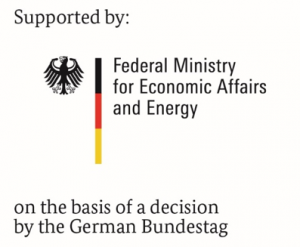WIR! GRAVOmer HoluMi 3D
Highly dynamic laser technology for ultrarapid, precise micro structuring of threedimensional surfaces
Subproject: Plant technology
Ultrashort pulse laser (USP Laser) are particularly suitable for high-precision microprocessing of surfaces, which are exposed to only a small amount of thermal pressure, due to short laser pulses. Therefore the material can be stripped superfine and precise. One problem of USP laser processing is, that currently only a small amount of machining speed can be achieved and implemented into performance. Hence, economical microstructuring of large surfaces is in actuality inconvertible.
To break these technological boundaries, the scheduled research and development project will pursue an innovative laser processing system as a goal. This system will enable highly precise, threedimensionally shaped surfaces (e.g. pre-structured embossing rollers, injection moulding or forming tools), by using new high performance USP Laser and polygonscanner. This new technology will enable the economic functionalization of components that are used for optimization and specific modulation of design, internal friction, optic and haptics, dirt adhesion or cell growth, by using threedimensional micro and nano structures.
Partner:
ACSYS Lasertechnik GmbH, Leibnitzstraße 9, 70806 Kornwestheim
Laserinstitut Hochschule Mittweida, Leipziger Str. 27, 09648 Mittweida
MOEWE Optical Solutions GmbH, Leipziger Str. 27, 09648 Mittweida
The project is funded by the federal ministry of education and research with grant number 03WIR2009B.

PoLariS
Production technology for laser-based manufacturing of crystalline solar cells of the next generation
Aim of the project:
The aim is to increase the productivity of the laser-based fabrication of crystalline solar cells. Especially, the off time of the laser has to be minimized. To reach this aim, the laser process is transformed towards a treatment of continuously moving wafers using a camera-based position detection.
In this project, MOEWE develops a 2D polygon mirror scanner with an increased line frequency > 2 kHz with an operating laser wavelength in the UV range (343 nm) for large area micro structuring of crystalline solar cells. The development includes a new motor design for the fast-rotating polygon mirror wheel and new electronics. The adaption of the mirrors to the UV wavelength requires investigations of new optical coatings.
The scanner is able to process the positioning data from the detection system for each scanned line in advance and can follow the moving work piece with the laser beam in real time. For highest accuracy, a fast laser beam switching with > 50MHz will be realized together with the partner Edgewave. A f theta objective will be developed from the partner Jenoptik, that is adapted to the pivot points of the polygon mirror scanner.
Finally, a new developed scanner will be integrated by Fraunhofer ISE and InnoLas Solutions into an existing machining center or a new demonstrator. From the usage, new knowledge will be gained concerning long term stability and reproducibility of ultra-fast laser beam processing with resolutions in the micrometer range. These results will be used for optimizations of the system.
Partners:
Fraunhofer-Institut für Solare Energiesysteme ISE, Heidenhofstrasse 2; 79110 Freiburg
JENOPTIK Optical Systems GmbH, Göschwitzer Straße 25 in 07745 Jena
EdgeWave GmbH, Carlo-Schmid-Str. 19, 52146 Würselen
InnoLas Solutions GmbH, Pionierstraße 6,82152 Krailling
MOEWE Optical Solutions GmbH, Leipziger Str.27, 09648 Mittweida
The project is funded by the federal ministry of economics affais and energy under the project PoLariS with grant number 03EE1008C.

Market launch of high-performance polygon mirror scanner
The project promotes the market launch of an innovative ultra-fast 2D polygon mirror scanner. Firstly, a pilot run with three devices is realized. Later, the devices will be used in the company as a fair model or free demo devices for advertising purposes.
The funding also includes the registration of intellectual property rights for the research and development work, the certification of the scanners by a third party and the design of a website by professional web designers.
The work is supported by the European regional development fund.

Transfer
The purchase of intellectual property rights enables MOEWE Optical Solutions GmbH to bring the polygonal mirror scanner developed and already built at Mittweida University of Applied Sciences to the market and develop it further.
The scanner uses two innovations of pixel clocking and double polygon. Pixel clocking allow the full digitization of the device resulting in significantly higher accuracy and very good controllability, while the double polygon enables low optical distortions in a very compact design working with high power laser beams and large beam diameters.
The work is supported by the European regional development fund (EFRE).

